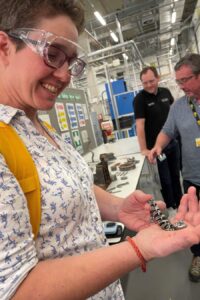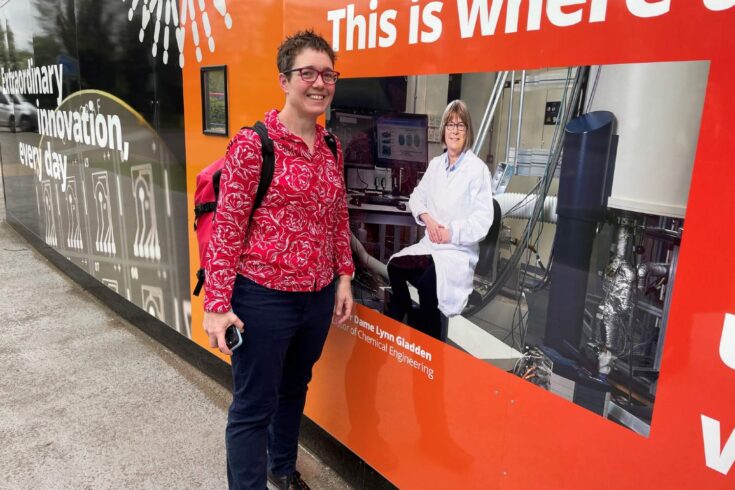One of the great privileges of my role as Executive Chair of the Engineering and Physical Sciences Research Council (EPSRC) is the opportunity to visit universities across the UK.
These are places where ideas flourish, partnerships grow, and the future of science and innovation is being shaped every day.
This summer, I wrapped up another round of visits to institutions hosting EPSRC investments. These visits are more than calendar entries. They are a chance to listen, to learn and to build the mutual understanding that underpins everything we do.
Conversations that matter
We, at EPSRC, believe that direct engagement with universities is essential to help shape the strategy and policy that will strengthen the UK’s research and innovation landscape. These visits are designed to foster open and honest conversations.
We shared our priorities, asked questions, and heard first-hand what is working, what is challenging, and what is inspiring.
We discussed:
- UK strengths in engineering and physical sciences
- emerging opportunities in artificial intelligence (AI), quantum technologies, health and national security
- how AI is transforming research practices
- talent and skills, including doctoral training
- infrastructure, technical skills and leadership
- research culture
- commercialisation and innovation
- partnerships with business, government and local communities
- interdisciplinary research
- financial sustainability
These conversations are just the beginning. We will continue them with individuals, institutions, and the wider research and innovation community.
With a new Industrial Strategy and a new UK Research and Innovation (UKRI) CEO, it is more important than ever that we represent the strength and ambitions of our research communities. That means staying connected.
From listening to action
Visiting in person allows us to hear directly from the whole community: researchers, students, technical professionals, and research enablers. Your insights, concerns and feedback are invaluable.
Across the board, your enthusiasm for your work is infectious. Some standout moments for me included:
- the innovative Centre for Doctoral Training at the University of Glasgow, where interdisciplinary thinking is being embedded from day one
- the robotics research at Heriot-Watt University, which is pushing boundaries in automation and human-machine interaction
- the Zero Carbon Cluster in Nottingham, showcasing how engineering research is driving sustainability at scale
- the TSN ROKS technical platform at the University of Warwick, a brilliant example of collaborative infrastructure supporting cutting-edge research
- the semiconductor cluster in Swansea, which is helping position the UK as a global leader in advanced materials and electronics
On a personal note, these visits reaffirm the dedication, enthusiasm and brilliance of the people who power our research and innovation system. Also, someone promised to let me watch them blow things up next time we visit. You can be sure I got my team to take note of that!
It is not just about talk. It is also about action. While we continue to reflect on what we heard and use it to inform decisions, we have already begun to act.
For example, we have shared concerns about financial sustainability with UKRI colleagues and are exploring how to respond, we listened to your concerns around Defence and National Security and have already put in place your core request, we have fed your views into the ongoing policy work on AI use.
Looking ahead

Charlotte Deane during a university visit. Credit: EPSRC
EPSRC has been nurturing strategic relationships with universities for over two decades, formally since 2008. These relationships are built on trust, openness, and a shared commitment to excellence.
Science and innovation remain key drivers of our national economy, and it is inspiring to see your passion in action, knowing that is fuelling our future.
Many of the UK’s fastest growing sectors have their roots in engineering and physical sciences. That is why I asked our evidence and evaluation team to do a deep dive into how early-stage ideas, often originating from university research, evolve into major partnerships, spin-outs and high-value jobs.
In November, EPSRC published a report on the economic impacts of curiosity-driven research. Understanding those mechanisms, what works, and how EPSRC can support them is critical to driving even greater impact in the future.
Thank you for welcoming us into your institutions, for sharing your work, and for helping us shape the future of UK research and innovation and the lives and livelihoods of so many across the UK.
I am already looking forward to the 2026 round of visits and to continuing these vital, and fun, conversations in person.
To hear more about EPSRC and for the chance to ask us questions, join Charlotte and the EPSRC leadership team at our community webinar in December.



